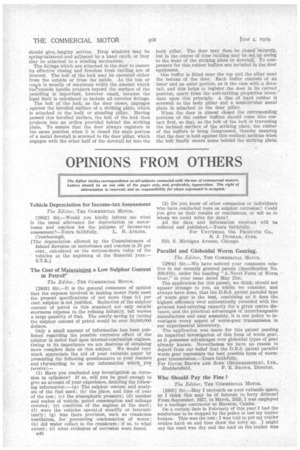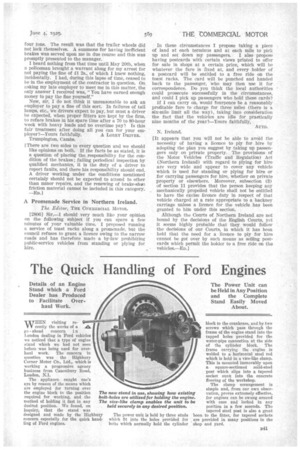OPINIONS FROM OTHERS
Page 66

Page 67

If you've noticed an error in this article please click here to report it so we can fix it.
Vehicle Depreciation for Income-tax Assessment The Editor, TEE COMMERCIAL MOTOR.
[2802] Sir,—Would you kindly inform me what is the usual allowance for depreciation on motorbuses and coaches for the purpose of income-tax assessment ?—Yours faithfully, L. B. ATKINS. Crowborough.
[The depreciation allowed by the Commissioners of Inland Revenue on motorbuses and coaches is 20 per cent., calculated on the written-down value of the vehicles at the beginning of the financial year.—
The Cost of Maint4initig a Low Sulphur Content in Petrol' The Edito?,•THE COMMERCIAL MOTOR.
[2803] Sir,—It is the general consensus of opinion that the expense involved in making motor fuels meet the present specifications of not more than 0.1 per cent, sulphur is not justified. Reduction of the sulphur content of petrol to this standard not only entails enormous expense to the refining industry, but wastes a large quantity of fuel. The yearly saving by raising the sulphur content of petrol would be over 50,000,000 dollars.
Only a small amount of information has been published regarding the possible corrosive effect of the sulphur in motor fuel upon internal-combustion engines. Owing to its importance we are desirous of obtaining more complete data on this subject. We would very much appreciate the aid of your valuable paper by presenting the following questionnaire to your readers and !forwarding to us any information which you receive:— (1) Have you conducted any investigation On corrosion in cylinders? If so, will you be good enough to give an account of your experience, detailing the following information:—(a) The sulphur content and analysis of the fuel used ; (b) the place, and time of year of the test ; (c) the atmospheric pressure; (d) number and makes of vehicle, petrol consumption and mileage covered; (e) condition of the engines at the start ; (f) were the vehicles operatal steadily or intermittent3y ; (g) was there provision, such as crankcase ventilation, for preventing condensation of water; (h) did water collect in the crankcase; if so, to what extent ; (0 what evidences of corrosion were found.
n40 (2) Do you know of other companies or individuals who have conducted tests on sulphur corrosion? Could you give us their results or conclusions, or tell us to whom we could write for data?
All the data and information received will be collated and published.—Yours faithfully, For UNIVERSAL OIL PRODUCTS CO., R. J. DURHAM, JUNE. 310, S. Michigan Avenue, Chicago.
Parallel and Globoidal Worm Gearing.
The Editor, THE COMMERCIAL MOTOR.
[2804] Sir,—We have. noticed your comments relative to our recently granted patent (Specification No. 309,418), under the heading "A Novel Form of Worm Gear," in your issue dated May 21st.
The application for this patent, we think, should not appear strangeto you, as whilst we consider, and always have done, that the D.B.S. patent parallel type of worm gear is the best, combining as it does the highest efficiency ever authentically recorded with the greatest load-carrying capacity for a given centre distance, and the practical advantages of interchangeable manufacture and easy assembly, it is our policy to investigate every aspect of worm-gear transmission in our experimental laboratory.
The application was made for this patent pending an impartial investigation of this form of worm gear, as it possesses advantages over globoidal types of gear already known. Nevertheless we have no reason to depart from our belief that the D.B.S. patent parallel worm gear represents the best possible form of wormgear transmission.—Yours faithfully, For DAVID BROWN AND SONS (HUDDERSFIELD), LTD., • Huddersfield. F. E. BROWN, Director.
Who Should Pay the Fine ?
The Editor, TEE COMMERCIAL MOTOR.
[2805] Sir,—May I encroach on your valuable space, as I think this may be of interest to lorry drivers? From September, 1927, to March, 1929, I was employed by a haulage contractor at Harsfon, Cambs.
On a certain date in February of this year I had the misfortune to be stopped by the police to test my trailer brakes. This was the test : I was told to put my trailer brakes hard on and then draw the lorry up. I might say the road was dry and the load on the trailer was
four tons. The result was that the trailer wheels did not lock themselves. A summons for having inefficient brakes was served upon me in due course and this was promptly presented to the manager.
I heard nothing from that time until May 20th, when a policeman brought a warrant along for my arrest for not paying the fine of £1 2s., of which I knew nothing, incidentally. I had, during this lapse of time, ceased to be in the employment of the contractor in question. On asking my late employer to meet me in this matter, the only answer I received was, "You have earned enough money to pay the fine yourself."
Now, sir, I do not think it unreasonable to ask an employer to pay a fine of this sort. In failures of tail lamps, etc., we drivers expect to pay, but must a driver be expected, when proper fitters are kept by the firm, to reface brakes in his spare time after a 70 to 80-hour week with heavy loads and no overtime pay? Is this fair treatment after doing all you can for your em ployer?—Yours faithfully. A LORRY DRIVER. Trumpington, Cambs.
[There are two sides to every question and we should like opinions on both. If the facts be as stated, it is a question of placing the responsibility for the condition of the brakes failing periodical inspection by qualified mechanics, it is the duty of a driver to report faults, and there his responsibility should end. A driver working under the conditions mentioned certainly should not be expected to attend to other than minor repairs, and the renewing of brake-shz3 friction material cannot be included in this category. —En.]
A Promenade Service in Northern Ireland. The Editor, THE COMMERCIAL Moroi/.
[2808] Sir,--I should very much like your opinion on the following subject if you can spare a few minutes of your valuable time. I proposed running a service of toast racks along a promenade, but the council refuses to grant a licence owing to the narrow roads and has therefore made a by-law prohibiting public-service vehicles from standing or plying for hire.
In these circumstances I propose taking a piece of land at each terminus and at each mile to pick up and set down my passengers. I also propose having postcards with certain views printed to offer for sale in shops at a certain price, which will be whatever the fare is fixed at, and every holder of a postcard will be entitled to a free ride on the toast racks. The card will be punched and handed back to the passenger, who may then use it for correspondence. Do you think the local authorities could prosecute successfully in the circumstances, and could I pick up passengers who hold these cards?
If I can carry on, would fourpence be a reasonably profitable fare to charge for three miles (there is a six-mile limit all the way), taking into consideration the fact that the vehicles are idle for practically nine months of the year?—Yours faithfully, Airro.
N. Ireland.
[It appears that you will not be able to avoid the necessity of having a licence to ply for hire by adopting the plan you suggest by taking up passengers only on private property. The provisions of the Motor Vehicles (Traffic and Regulation) Act (Northern Ireland) with regard to plying for hire are very wide and appear to cover any vehicle which is used for standing or plying for hire or for carrying passengers for hire, whether on private property or elsewhere. Moreover, subsection (3) of section 11 provides that the person keeping any mechanically propelled vehicle shall not be entitled to have the excise licence duty in respect of that vehicle charged at a rate appropriate to a hackney carriage unless a licence for the vehicle has been granted to him under this section.
Although the Courts of Northern Ireland are not bound by the decisions of the English Courts, yet it seems highly probable that they would follow the decisions of our Courts, in which it has beon held that the need for a licence to ply for hire cannot be got over by such means as selling postcards which permit the holder to a free ride on the vehicles.—En.]




















































































































